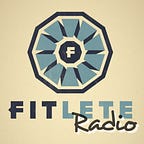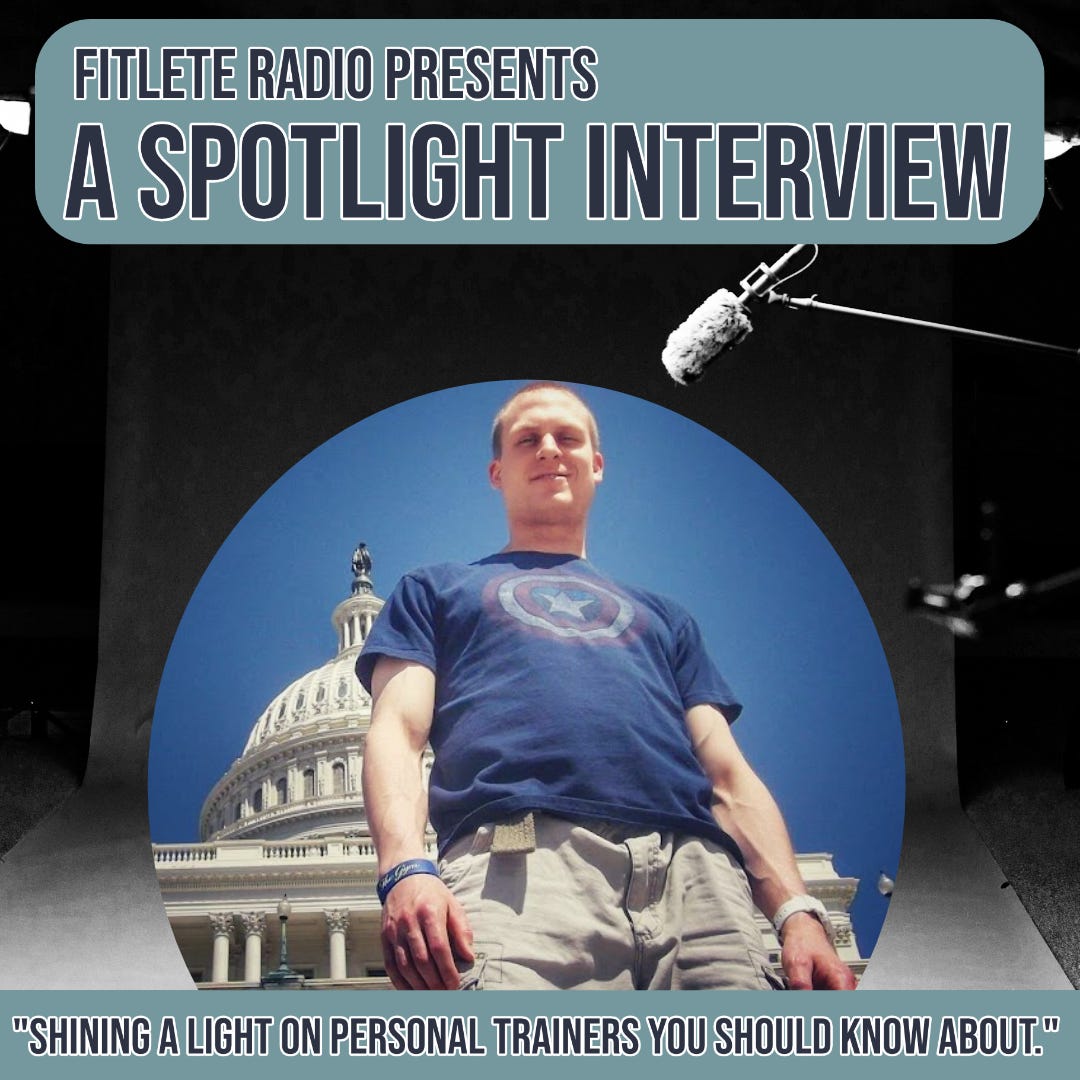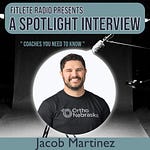We get to know Eric Buratty in this Trainer spotlight episode of FITLETE Radio.
GEORGE: Introduce yourself and tell us a little about what you do and your background.
Most people simply know me by my first and last name, Eric Buratty, and that's spelled E-R-I-C-B-U-R-A-T-T-Y. And that remains consistent across all platforms and domains, so if you were to do a Google search, and this is how people know me personally and professionally. In terms of my education history, I did graduate from Salisbury University back in 2011, and since that time, I've been heavily involved in the health and fitness world. I've written for a few online publications, I've published my own book, actually books, plural. The most recent being Make America Fit Again, and you can find that on Amazon. I believe some third party sellers also carry that, like Barnes and Noble. But my clients, my ideal clients that I work with now tend to be, I guess, more so like the 40 to 60 year old population with their age range. And they're just trying to get unstuck or trying to reverse or undo some of the stress they've accumulated on certain joint areas. Whereas when I first started out in the fitness world, I was more into the aesthetic goals. So your typical, I want to improve my body composition, that sort of thing. And if that's what people are about, that's exciting for them, that's great. But I find more excitement and I gravitate mostly towards people that are in the preventative maintenance side of things. So that is mostly along the lines of what I do when I operate out of the private studio that I train at in Gaithersburg, Maryland. And then when I also do, I travel to people's houses, and I also cater to people within recreation community centers locally.
GEORGE: Tell me a funny or interesting story about yourself that help's us get to know you as a human.
(Sorry, there was an error in the transcript of this answer)
GEORGE: What strategies do you use to attract and retain clients in your personal training business?
Honestly, man, I'm just a huge fan of keeping things simple when it comes to attracting and retaining clients. I know in today's world, it's rather easy to get distracted or caught up in a lot of the bells and whistles and complex marketing strategies, rather, in terms of trying to reel people in like you're fishing to attract and retain clients. You're using all these psychological hacks to get people emotionally involved into the process of trading and you're trying to sell them something. I'm like, that's great and all, but my approach, I just like being a good person at the end of the day. What I mean by that is you're training somebody like you're treating them. The way you train people is the way you treat people and vice versa. If you don't have a good personality or you don't have good standards, good moral ethical codes about you, none of that other stuff is actually going to work or pan out in the long run. Yeah, you might be able to sell people some training packages in the short run, but it's not going to withstand the test of time if somebody doesn't have some sort of baseline moral ethical code about being a good person. That's really where it all stems back, comes back to for me, is just being a good person when it comes to attracting and retaining clients.
GEORGE: What is your process for assessing a new client's fitness level and addressing their goals?
So, let's just keep it real once again. I like asking people what health and fitness means to them. That answer that they give us will give you a huge clue into what area you need to lean into as a coach to give that client the service that they are hiring you for. Or potentially hiring you for if they're still in that, you know, you're in that prospect state. You're trying to convert them into more of a consistent customer, a paying client basically. Another thing that we can do from an assessment standpoint is keeping things simple once again, looking at observing the way they move and function on a day-to-day level. So, the way they walk on flat surfaces, the way they might climb up and down a flight of steps, the way they might pick something up from the floor. All of these are huge clues into say, the stress, the potential stress they might carry when they perform a functional exercise, you know, when they're trying to do something to strengthen their body. So, that's probably the best way to do it. Of course, we can use basic mobility things. We can pull a lot of strategies from the mobility courses and, you know, we can look at hip external, internal rotation, perform overhead reaches, you know, look at their, the way they're bending at their hips, forwards, backwards, the degrees to which they can achieve a certain range of motion, but I'm like, let's just look at the way they move too first, the way they might bend down and pick up, you know, something from the floor. So, I just try to keep it simple when it comes to that.
GEORGE: What certifications do you hold, and how do you stay updated on the latest fitness trends and research?
My primary certification is through ACE. And since 2011, I have obtained a series of CEUs, you know, your continuing education units, through weightlifting, nutrition, muscle testing, Animal Flow Level 1, Level 2 certifications. And just, I guess, in terms of staying updated on the latest fitness trends and research, I'm just always aware and observant over what matters to people, whether it's coaches or the clients themselves. So, going back to that question that I asked earlier when I was answering the assessment question, you know, what does health and fitness mean to people? And then, obviously, you're diving into the trends with social media and seeing what people are into. And you kind of also get back to the heart of what matters, too, when you're taking into account, not just the art, the prescription of exercise, but the science to it, and just staying very aware and cognizant over the adaptation process. So, when I refer to adaptations, I'm talking about the blood supply, nerve supply. And to just keep things simple, once again, the body gets good at what it does, you know, the specificity principle of training, basically. And if you keep a certain series of variables constant and measure them over time, and are aware enough of that, or you just document them in your spreadsheets or whatever, you know, Microsoft Drive, Google Drive documents you have going, you can kind of, I mean, make your own science as you go along. Because we can do PubMed searches and follow some doctors and stuff that we trust. You know, they have a reputation about them, and they're good people at the end of the day. But I think it's also a good behavior, a good habit as coaches to be able to keep the basics in mind, perform them at a high enough level, and then be able to prescribe them at a level that people can do that's also consistent to what health and fitness matters means to them as well.
GEORGE: How do you envision your personal training business evolving in the next few years?
I think the most obvious way to evolve my current personal training business in the next few years, and if we're keeping it real, also kind of speaking for coaches as a whole, for anyone listening, I think the best way course of action would be to transition into more of that online training scenario. Whether you are conducting your training sessions through some sort of third-party app or you are designing programs and selling them online as kind of like your bread and butter. You find a way to get into those two areas, I think that's the best way to withstand the test of time or just be like sustainable in the next few years. I think that's probably going to be the most practical way that I would like to dive into and without spending several hours when it comes to maintenance of a gym space, which would be the second tier answer to that is to evolve my own training business currently would be to find some sort of space where I can operate and function and just help people get unstuck instead of only focusing on the aesthetic goals.
GEORGE: What do you think are the biggest challenges currently facing the fitness & personal training industry?
I think the biggest challenge we face in the current personal training and fitness world is We're at competition With the rate at which information travels which is extremely fast now People are obtaining the vast majority of their information for free mind you through Social media apps and through online sources that they are no longer Seeing the same value into personal training when they can just get it for free through this other source So honestly, I think that's the biggest challenge We're competing also with this concept of real versus fake We're living in a world once again where? Instant gratification becomes this new expectation and That's a very fake expectation to have and it's not gonna be sustainable over the long run. It's gradual consistent Small efforts on a day-to-day basis. It's the lifestyle part that we're losing this battle is Teaching people about the lifestyle instead of it's you know This is some overnight success thing. You can just take this or that pill or You can do just just do you just use this word. Just just do this. Just do that and You know people like their lists. So if you look online And you say this is how content is made Oh three ways to blah blah blah blah blah or the top five Products for blah blah blah and then that's how content is made. So Just for the sake of content. We're also competing in a world where coaches themselves are trying to like push their content to compete with other coaches when that's getting in the way of Truly making a difference in the people's lives that we're trying to help
Want more Eric Buratty in your life? You can find’em here:
visit: https://about.me/ericburatty
Instagram: https://www.instagram.com/ericburatty/
Book: Make America Fit Again















